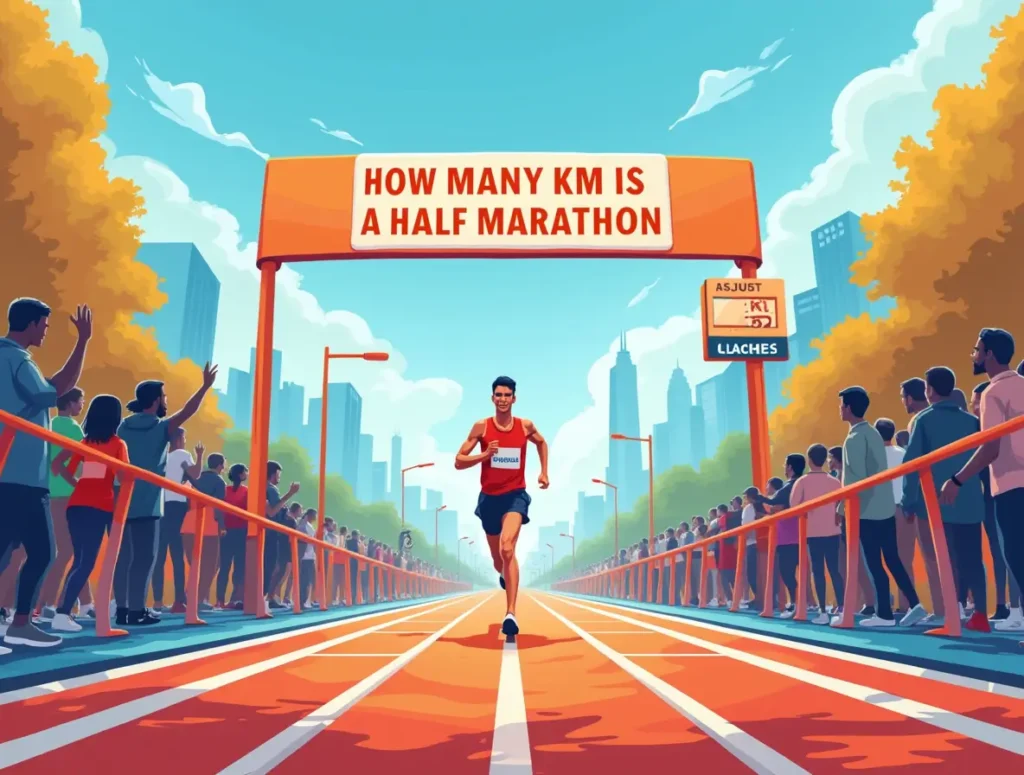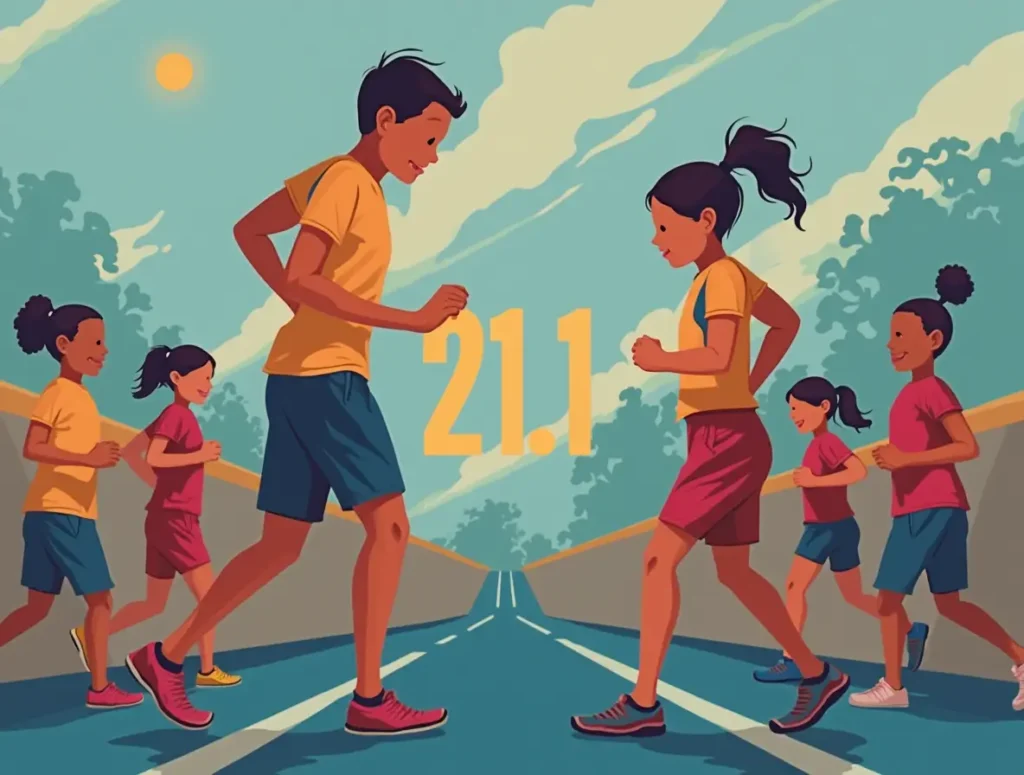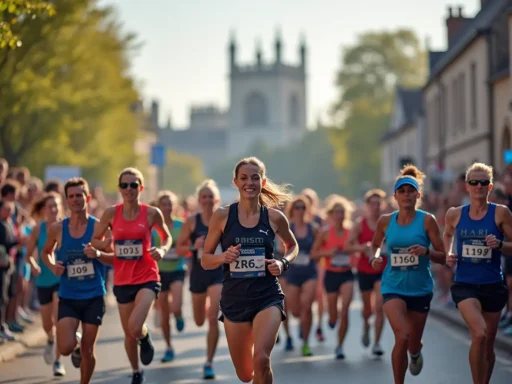Thinking about how many km is a half marathon? You might wonder how many km it is.A half marathon spans 13.1 miles, equivalent to 21.1 kilometers. It’s a big challenge that needs hard work and training.

Did you know over 2.1 million runners finished half marathons worldwide in 2018? It’s a popular goal for many. Knowing the distance and what it takes is key to success. So, a half marathon is 21.1 kilometers. With the right training, you can reach this goal and feel proud of yourself.
Table of Contents
Understanding Half Marathon Distance in Kilometres
When you ask how many km is a half marathon, the answer is simple: it’s about 21.0975 kilometers. This distance is key in running and sports. It’s a good test for those who don’t want to run a full marathon.
The half marathon’s length is vital for training. Runners need to know how many km is a half marathon to plan their training. This usually takes about 12 weeks, helping them build up to 21.0975 kilometers.
The Exact Distance Breakdown
A half marathon is half the length of a full marathon, which is 26.2 miles or 42.195 kilometers. This helps runners understand the challenge they face. Knowing the exact distance is key for setting goals and training well.
Converting Miles to Kilometres
For those who prefer miles, knowing the half marathon’s distance in kilometers is useful. It’s about 13.1 miles, or 21 kilometers. This helps runners who train in miles to plan better.
Why This Distance Matters
The half marathon distance is significant because it’s a tough but reachable goal. Finishing it takes a lot of training and effort. But the feeling of achievement is huge. Whether for fitness, charity, or personal reasons, knowing the distance is crucial for success.
| Distance | Kilometers | Miles |
|---|---|---|
| Half Marathon | 21.0975 | 13.1094 |
| Full Marathon | 42.195 | 26.2 |
How Many KM Is a Half Marathon: The Official Measurement
Understanding how many km is a half marathon is key. It’s 21.0975 kilometers, which is the same as 13.1094 miles. Imagine running nearly 53 laps on a 400-meter track to reach this distance.
For runners, knowing the half marathon distance is vital. An intermediate runner will take about 20,000 steps to finish. This is roughly 5 times what an average American walks in a day. Knowing the distance helps runners plan their training and aim for their goals.
The time it takes to finish a half marathon varies. In the UK, the average time is 2:02:43. Men finish in about 1:55:26, while women take around 2:11:57. These times help runners set realistic goals and track their progress.
Here are some important stats for half marathon training:
- Average half marathon pace for men in the UK: 5:29 min/km (8:49 min/mile)
- Average half marathon pace for women in the UK: 6:16 min/km (10:04 min/mile)
- Target finish time for advanced male runners: between 1:10 and 1:30
- Target finish time for advanced female runners: between 1:20 and 1:40
Common Half Marathon Routes and Terrain Types
When thinking about half marathons, it’s key to consider the different routes and terrains. A half marathon is 21.0975 kilometers long. The course type greatly affects your run.
Half marathons can be in cities or countryside, each with its own feel. City courses are usually flat and paved. Trail half marathons, however, are tougher with hills and varied surfaces.
Urban Course Characteristics
Urban half marathons, like the Great Birmingham Run, are on flat, paved roads. These are fast and great for those aiming for a personal best.
Trail Half Marathon Variations
Trail half marathons are more challenging and beautiful. The Two Tunnels Half Marathon in Bath has nearly 5 miles underground. The Edinburgh Winter Half Marathon offers a warm vibe and stunning hill views.
Elevation Considerations
Elevation greatly affects your half marathon. Courses like the Great Scottish Run have hills, while Lisbon’s is flat. Knowing the elevation helps you prepare and pace better.
Essential Training Milestones for Your Half Marathon
To figure out how many km is a half marathon, it’s about 21.1 kilometers. Training for this distance needs a solid plan. Beginners start with 10 to 15 miles a week, reaching 25 to 30 miles. More seasoned runners begin at 25 miles, aiming for 40 or more.
A good training plan boosts endurance, speed, and strength. Mix in endurance runs, speed workouts, and strength exercises to enhance your performance. Start with a three-mile run and increase your long runs to 10 or 11 miles.

Here are some key training milestones to include in your plan:
- Gradually increase weekly mileage by no more than 10% each week
- Incorporate strength training at least two times a week to improve running form and prevent injury
- Include cross-training options, such as cycling or swimming, to reduce the risk of overuse injuries
- Designate rest or recovery days to allow your body to repair and adapt
Consistency and patience are crucial for half marathon training. With a solid plan and commitment, you can reach your goal and finish the 21.1 kilometers confidently.
Building Your Weekly Training Schedule
Training for a half marathon needs a good weekly plan. This plan should mix running, rest, and other exercises. It helps build endurance and prevents injuries. Since a half marathon is 21.1 kilometers long, you should slowly increase your running distance.
Start by focusing on progressive distance building. Increase your weekly running by no more than 10% each week. This lets your body get used to running long distances. Don’t forget to include recovery and rest days in your plan. These days are crucial for your body to heal and get stronger.
Sample Training Schedule
A typical half marathon training plan might look like this:
- Run 3-4 times a week, with a longer run on the weekend.
- Have 1-2 rest days each week, based on your fitness and goals.
- Include 1-2 cross-training sessions a week, like cycling or swimming.
Always listen to your body and adjust your plan if needed. If you’re tired or in pain, it’s okay to take an extra day off or change your workouts. The goal is to balance training and rest to reach your half marathon goal, which is how many km is a half marathon, 21.1 kilometers.
| Week | Monday | Tuesday | Wednesday | Thursday | Friday | Saturday | Sunday |
|---|---|---|---|---|---|---|---|
| 1 | 3 miles | Rest | 3 miles | Rest | 3 miles | 5 miles | Rest |
| 2 | 3.5 miles | Rest | 3.5 miles | Rest | 3.5 miles | 6 miles | Rest |
By sticking to a structured plan and listening to your body, you can train for a half marathon successfully. This way, you’ll know the answer to how many km is a half marathon with confidence.
Nutrition and Hydration Strategy
Knowing how many km is in a half marathon is key for a good nutrition and hydration plan. A half marathon is about 21 kilometers. It’s vital to eat right and stay hydrated for the best performance.
Start with 500ml of energy drink for breakfast to get carbs and hydration. This helps prepare you for the race.
Drink 200ml of water 10 to 15 minutes before the race starts. Water stations are every 5 kilometers. This means you can drink up to 300ml in the first half of the race.
After 15km, drink less. Fluids won’t be absorbed in time to help before the finish.
Some important tips for nutrition and hydration are:
- Drink regularly, especially for runs over 90 minutes
- Use energy gels like Energy Gel Caffeine or Energy Gel Aqua Caffeine at set times
- Eat a balanced meal 1 to 2 hours after the race
- Watch your urine color to check if you’re hydrated. Clear yellow means you might be drinking too much. Apple juice color suggests you’re not drinking enough.
By following these tips and knowing the distance of a half marathon, you can create a plan. This plan will help you perform well and reach your goals.

Race Day Preparation and Pacing
Knowing the distance of a half marathon is key. It’s 21.1 kilometers long. To reach your goal time, a good pacing plan is vital. For a 1 hour 40 minutes finish, you need to run at 4:44 min/km.
Your race can be split into three parts of about 7 km each. The first 7 km is easy, where you aim to keep your pace. The second 7 km is tougher, where you fight fatigue while trying to stay on pace. By 14 km, you’ve done two-thirds of the race. The last 7 km is fun, where you can speed up if you have energy left.
Morning Routine
A good morning routine is crucial for a successful half marathon. It includes what to eat and drink before the race and getting to the start on time. A well-planned morning helps you stay focused and ready for the race.
Pacing Strategies
Creating a good pacing strategy is key to reaching your goal time. Start 10 seconds per mile slower than your goal pace to save energy. As you run, adjust your pace based on how you feel and how far you have left.
Energy Management
Managing your energy well is vital for a half marathon. This means eating the right foods and drinks before and during the race, and pacing yourself to avoid exhaustion. Knowing the distance and having a good pacing plan helps you finish strong and meet your target time.
Common Challenges and How to Overcome Them
Training for a half marathon can face many challenges. Knowing the distance, about 21.1 kilometers, helps prepare you. Physical obstacles like injuries or fatigue are common.
To beat physical challenges, listen to your body and rest when needed. A good training plan mixes running, cross-training, and rest. Strength training and stretching can also prevent injuries and boost performance.
Physical Obstacles
- Injuries, such as shin splints or runner’s knee
- Fatigue and burnout
- Dehydration and electrolyte imbalance
Mental barriers, like self-doubt or lack of motivation, are also big hurdles. Setting realistic goals and celebrating small wins helps. Having a support group or mentor keeps you motivated.
Mental Barriers
- Self-doubt and lack of confidence
- Fear of failure or not meeting expectations
- Difficulty staying motivated and focused
Knowing how to tackle common challenges prepares you for a half marathon. Stay hydrated, eat well, and listen to your body to avoid injuries. With hard work and determination, you can conquer any obstacle and finish a half marathon.
Conclusion: Your Journey to 21.1 Kilometres
As you finish your half marathon, take a moment to think about what you’ve done. Running 21.1 kilometres is a big achievement. You’ve done it with hard work, determination, and the help from this guide.
Whether it was your first half marathon or not, you should be very proud. You’ve pushed yourself and come out stronger. You’ve learned a lot, faced challenges, and made friends with other runners.
Now, keep setting new goals and finding new places to run. The half marathon is a big deal, and you should be proud of your medal. Join running clubs, get support, and use this experience to reach even higher goals.
FAQ
What is the exact distance of a half marathon in kilometres?
A half marathon is officially 21.1 kilometres, or 13.1 miles.
Why is the half marathon distance significant?
The half marathon is a big challenge but still reachable for many. It’s longer than a 10K but shorter than a full marathon. This makes it perfect for those wanting to test their limits.
What are the different types of half marathon routes and terrain?
Half marathons can be on city streets or natural trails. The terrain and elevation can change a lot, depending on where it is.
What are the essential training milestones for a half marathon?
Key training steps include increasing your weekly runs and doing speed and endurance workouts. It’s also important to rest well. A good training plan helps get your body and mind ready for 21.1 kilometres.
How should I approach nutrition and hydration for a half marathon?
Good nutrition and hydration are key for a half marathon. Plan what to eat and drink before, during, and after your runs and the race.
What are some common challenges I may face during a half marathon, and how can I overcome them?
You might face physical issues like tired muscles and joints, or mental hurdles like losing motivation. Weather can also be a challenge. Having strategies to deal with these can help you finish the 21.1-kilometre race.




